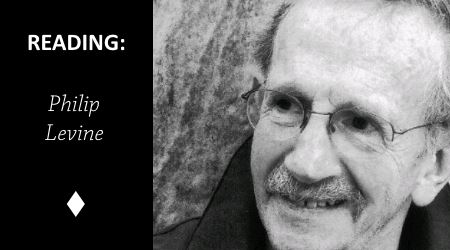Philip Levine (1928-2015) was an American poet. As a boy, he worked in the factories of Detroit and was fascinated by the events of the Spanish civil war. He was among the most important poetic voices of the industrial poor of the twentieth century. I read a seemingly playful piece of his that is not about the plight of the poor.
Theory of Prosody
When Nellie, my old pussy
cat, was still in her prime,
she would sit behind me
as I wrote, and when the line
got too long she’d reach
one sudden black foreleg down
and paw at the moving hand,
the offensive one. The first
time she drew blood I learned
it was poetic to end
a line anywhere to keep her
quiet. After all, many morn-
ings she’d gotten to the chair
long before I was even up.
Those nights I couldn’t sleep
she’d come and sit in my lap
to calm me. So I figured
I owed her the short cat line.
She’s dead now almost nine years,
and before that there was one
during which she faked attention
and I faked obedience.
Isn’t that what it’s about–
pretending there’s an alert cat
who leaves nothing to chance.
It is an image poets should cherish: What distinguishes their craft from other genres of writing is the contribution of a pussycat. Many definitions of poetry still regard the conspicuous line
breaks as the characteristic of poetry. In my view it is not the line breaks themselves but the fact that it has been given a thought by the author.
In speaking, prosody as conscious control over rhythm and tone, has a similar function. We take care of the form in which we convey our message, and by doing so we pay respect to the gods – after all, we all know that cats are gods, or they act like them.
The cat faking attention and the poet faking obedience, that is a pretty description of our current predicament. God is dead and all that, no-one is paying attention, and yet we fake obedience because we owe something to the gods. We pretend to be observed and we live by the rules of a passing deity. If we all do so, that deity will regain some Jungian social reality. But let’s not stretch the concept too much. This poem is simply about a cat ruling over a typewriter and the notion that poems owe their shape to something that lies beyond their control.

One thought on “Reading: Theory of Prosody by Philip Levine”
Comments are closed.